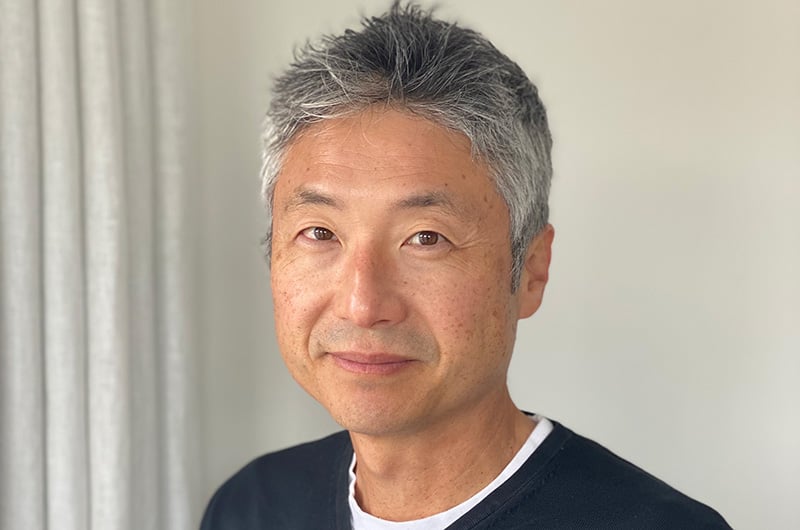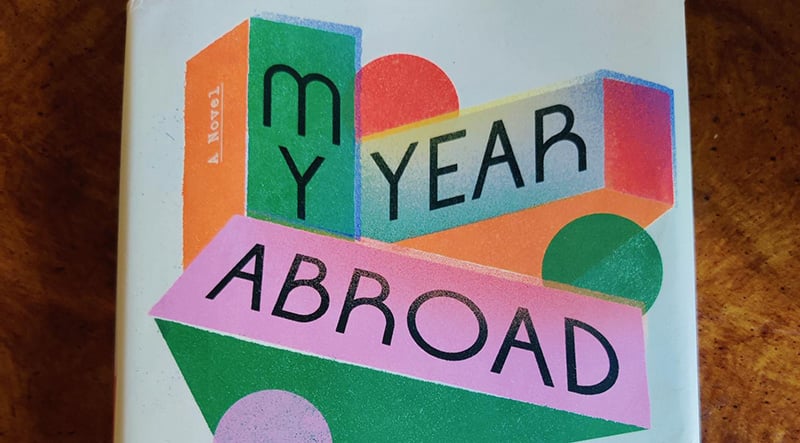
Something to know about Korean-American author and Pulitzer finalist Chang-rae Lee, MFA ’93 (creative writing), is that he talks about his characters like they are friends instead of figments, like they are in the room, like they have been mirroring each other’s habits for a while now.
And maybe it was Lee’s experiences in Eugene that ultimately shaped the creation of Tiller, the insecure yet perceptive 20-year-old protagonist of Lee’s newest coming-of-age novel, My Year Abroad (2021), a book that has been five years in the making.
It is a thriller as much as a romance. Tiller’s experiences growing up ⅛ Asian, motherless, and, at least in his eyes, mediocre, make him yearn for something greater than himself, for a type of cultural immersion that will give him the connections he feels he is missing. And that is where Pong comes in, a man who Tiller eventually calls, “(his) big brother, (his) mentor, (his) spirit guide to this and every other demimonde we might find ourselves in.”
“(Tiller) does have that rich inner, complicated life and talent. It is just that he had not tapped into it yet, and this story is a way for him to do that. But he needed Pong, of course, to draw it out of him,” Lee said about the dichotomy of the two characters’ relationship.
Maybe it was Lee’s experiences in Eugene that ultimately shaped the creation of Tiller, the insecure yet perceptive 20-year-old protagonist of Lee’s newest coming-of-age novel, My Year Abroad (2021), a book that has been five years in the making.
The novel follows Tiller’s adventures with the charismatic, wild-haired, ox-like Chinese chemist and, as the reader will discover, con-artist who fuels Tiller’s ego, but the novel also explores the wildly unconventional family Tiller creates following the fallout that Pong leaves him with.
As Tiller muses in the novel, “it is often difficult to live just one life.”
So, ultimately, the novel becomes less about Tiller’s year abroad, and more about what he does with what he learns upon coming home. It is a story about change as much as it is about trying to create something long lasting; about how human connection can both create and exorcise demons, to take from a quote in My Year Abroad.

Cover of My Year Abroad, the new novel by Chang-rae Lee.
These themes were prevalent in Lee’s own life during his time in Eugene and at the UO, both of which offered him some of the same adventures that Tiller is seeking in the narrative.
Lee had the UO recommended to him by close friend and fellow writer Patty Dann while he was still living in New York City, working odd jobs, and struggling to find his craft. He needed a change of pace, and like Tiller in My Year Abroad, was at a crossroads in almost every sense of the word.
“I decided that I needed to go to an MFA program to commit myself,” Lee said. So, he took a leap of faith, like Tiller, “not knowing quite what might happen.”
Eugene was the place Lee had his own coming-of-age. It is where he met his wife, Michelle Branca, became a father, wrote the first chapter of his debut novel, Native Speaker (1995), for his thesis, and ultimately discovered what would become a lifelong love of teaching.
Lee is now a professor of creative writing at Stanford University, but previously instructed at Princeton and Hunter College. He has won a multitude of awards for his writing, including the Hemingway Foundation/PEN Award, and has written for large-scale publications such as the New York Times and Conde Nast Traveler. His experiences teaching at the UO, however, hold special significance for the author, as it is where he established his career and grew through his young adult years.
“Being responsible for certain aspects of the creative writing program taught me a lot about responsibility and managing my own time,” he said, adding that in regard to Eugene, he “will always have wonderful memories of (his) time there and can picture every house and apartment that (he) lived in and they were wonderful and awful at the same time.”
“I wanted the balance of (the mundane and the fantastical) and the push and pull of those two things. In the story, there is a lot of movement, there is a lot of crazy, lurid stuff, there is a lot of expeditionary energy . . . although it can be fun just having that I liked having the quieter but still fraught domestic story giving a different kind of tone, and most importantly, a different viewpoint and way for Tiller to roam in his thoughts.”
– Chang-rae Lee
It is an author’s sentiment, but Lee seems to be fascinated by moments simultaneously wonderful and awful, the bittersweetness of memory, the fantastical amidst the mundane. It is what makes My Year Abroad so special, as the reader gets to be immersed in the human experience through the eyes of Tiller and the prose-heavy, heart-wrenching descriptions which are Lee’s specialty.
“I wanted the balance of (the mundane and the fantastical) and the push and pull of those two things,” he said. “In the story, there is a lot of movement, there is a lot of crazy, lurid stuff, there is a lot of expeditionary energy . . . although it can be fun just having that I liked having the quieter but still fraught domestic story giving a different kind of tone, and most importantly, a different viewpoint and way for Tiller to roam in his thoughts.”
One example is that of the novel’s watermelon symbolism. For Pong, the watermelon is “a quantum of sweetness” from a time during which he had to endure great suffering. It is an anchor, in other words, something mundane and yet deeply significant among the tumultuousness of Pong’s life.
When asked what Lee’s “watermelon” would be, he answered “I guess we do all have one, something that may bring you back to a certain fundamental self or moment. I would not be surprised if mine also ended up being a particular food, because food tastes of memory, of a certain moment in life . . . for me, maybe it would be something that my mother made for me as a kid . . . I will remember it and think about those moments that we had.”
It is sufficient to say that most people probably have more than one “watermelon” in life and that for many, aspects from the UO and Eugene probably qualify. But whether you are a new graduate or have been an alumnus for ages, My Year Abroadwill resonate with anyone approaching a new stage in their lives, trying to find their place in the world, or waiting for that catalyst to move them toward doing so.
– story by Sage Kiernan-Sherrow, UOAA associate. Photos by Michelle Branca Lee.
Lee's work is also making its way to the DisOrient Film Festival. Inspired by one of Lee's many essays, Coming Home Again encompasses the pain that comes from watching a loved one battle a terminal illness. The UOAA wants to make sure you can enjoy Coming Home Again, so as a sponsor of the DisOrient Film Festival we’re offering $5 off your first order of the all access festival pass for all Ducks. Use the code UOAlumAssoc21 when checking out.

